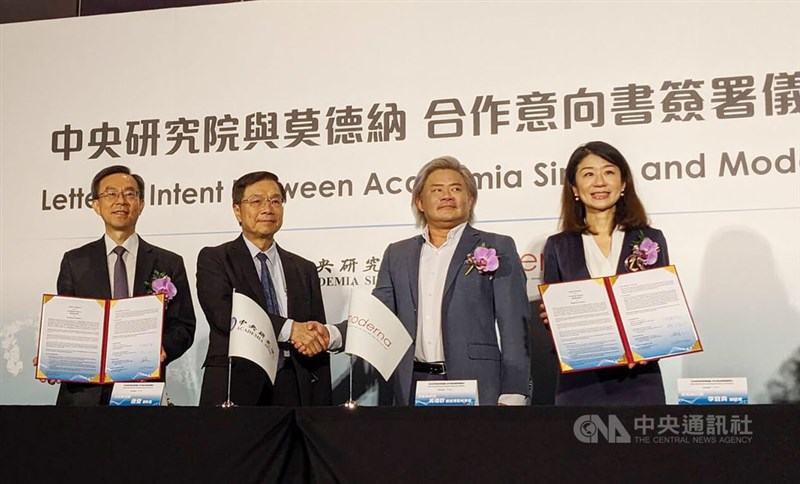Academia Sinica, Moderna to cooperate on mRNA research
Academia Sinica and vaccine developer Moderna Inc. have agreed to jointly develop messenger ribonucleic acid (mRNA) technology and cultivate research talent in Taiwan under a five-year strategic partnership announced Thursday.

Taipei, June 1 (CNA) Academia Sinica and vaccine developer Moderna Inc. have agreed to jointly develop messenger ribonucleic acid (mRNA) technology and cultivate research talent in Taiwan under a five-year strategic partnership announced Thursday.
A letter of intent signed between the two parties includes plans for establishing an mRNA technology and vaccine research and development platform where startups can demonstrate their products and conduct exchanges, Academica Sinica said in a press release.
According to Moderna Taiwan General Manager Joyce Lee (李宜真), the partnership’s first venture will be an mRNA innovation awards program to select five research teams or individuals, with Moderna providing award winners with prize money of NT$500,000 (US$16,263) and guidance from the company’s experts.
Submissions of projects in five areas covering infectious diseases, immuno-oncology, rare diseases, cardiovascular diseases and autoimmune diseases will be opened June 9 with a deadline falling at the end of July.
Lee said that through cooperation with Academia Sinica, Moderna Taiwan hoped that more mRNA research will be conducted to explore more possibilities of mRNA applications and find innovative solutions to the healthcare challenges facing the world, while developing technology to improve disease prevention and clinical treatment.
Lee noted that Taiwan is the only Asian country where Moderna is conducting clinical trials for its flu vaccine.
She added that Moderna Taiwan hoped to bring the most effective medicines and vaccines to Asia and become a talent incubation hub in the region in preparation for the next pandemic.
Meanwhile, Academia Sinica Vice President Tang K. Tang (唐堂) said that the research academy formed its first mRNA vaccine research and development team at the end of 2020, using its mRNA pilot research facility to develop vaccine candidates for early clinical trials.
On-site verification of the mRNA pilot research facility is expected to be completed by the end of this year before it is scheduled to open to small-scale trial mass production by the industry and academia in 2024, Tang added.
According to Tang, Academia Sinica’s Biomedical Translation Research Center, which is part of the National Biotechnology Research Park, has helped 59 companies, including 13 publicly listed companies, with a total market value of about NT$350 billion, accounting for 29 percent of the total market value of the biomedical industry in Taiwan.
Date: 2023-06-01
Source: Focus Taiwan